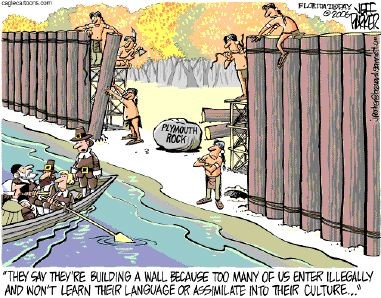Century Marks

Prayer changes people: After Hillary Clinton was elected to the Senate in 2000 she showed up one day at a Senate prayer group that usually drew conservative figures like Sam Brownback of Kansas and Rick Santorum of Pennsylvania. The speaker that day was Brownback himself, who had planned to talk about how a recent scare with cancer had deepened his faith. Upon seeing Clinton, he changed his subject. He talked about how he had previously hated her and said derogatory things about her. “Mrs. Clinton, will you forgive me?” he asked. She said she would, and expressed appreciation for his apology. The two unlikely partners subsequently worked together on legislation, including a bill to protect refugees fleeing sexual abuse (Atlantic Monthly, November).
Good questions: In Judaism, according to Jonathan Sacks, chief rabbi of Britain and the Commonwealth, “to be without questions is not a sign of faith, but of lack of depth.” Jews are encouraged not only to ask questions about the meaning of the faith, but to question God. We ask questions, says Sacks, “not because we doubt, but because we believe.” There are, however, three conditions for asking questions rightly: a genuine desire to learn; a readiness to accept the limits of one’s understanding; and the realization that, when it comes to Torah, one learns by living and doing. “There is no way of understanding Shabbat without keeping Shabbat” (Rabbi Jonathan Sacks’s Haggadah, Continuum).
Found what I’m lookin’ for: A eucharistic liturgy which incorporates music by the Irish rock band U2 is spreading around the country in Episcopal churches. Begun in 2005 by Paige Blair, a priest in York Harbor, Maine, the service uses U2 songs in place of traditional hymnody. Blair says she has spoken with about 150 churches in 15 states and seven countries that have had or plan to have similar services. Although the services vary from place to place, one commonality is the taking of an offering for U2 lead singer Bono’s campaign to wipe out poverty and AIDS. Blair’s church is starting a “U2-charist team” to take the liturgy around the country (USA Today, October 25).
Getting to church in China: At the end of a two-week tour through China, Rowan Williams, the archbishop of Canterbury, said he believes that in some regions of the country the percentage of the population attending church on Sundays is as large as or even larger than that in most Western European countries. “The astonishing and quite unpredictable explosion in Christian numbers in recent years is clearly connected to a widespread sense that the equally extraordinary explosion in the economic life has left many huge questions about personal and social values unanswered,” said Williams. The Anglican leader said his group raised questions about a number of cases of reported harassment of religious people. Meanwhile, a senior government official said that Christian Sunday schools have the potential to contribute to a “mature and stable public morality” in China (Ecumentical News International).
Gotcha—take one: When member of Congress Lynn Westmoreland (R., Ga.), who cosponsored a bill to display the Ten Commandments in the U.S. Capitol, appeared on The Colbert Report, host Stephen Colbert asked him to name all ten. Caught off guard, Westmoreland had trouble naming three (Chicago Tribune, October 22; interview appears at youtube.com).
Gotcha—take two: When Jeff Stein, national security editor at the Congressional Quarterly, asks people on Capitol Hill and in federal agencies whether they know the difference between Sunni and Shi‘ite Muslims, he often gets blank stares. Terry Everett (R., Ala.) responded, “One’s in one location, another’s in another location. No, to be honest with you, I don’t know.” Everett is vice chair of the House intelligence subcommittee on technical and tactical intelligence. Commented Stein, “Wouldn’t British counterterrorism officials responsible for Northern Ireland know the difference between Catholics and Protestants?” (New York Times, October 17).
Catching fever: For this election season, here’s a quote from that astute observer of America, Alexis de Tocqueville, who after his visit to the U.S. in 1831 wrote: “As the election draws near, intrigues intensify, and agitation increases and spreads. The citizens divide into several camps, each behind its candidate. A fever grips the entire nation. The election becomes the daily grist of the public papers, the subject of private conversation, the aim of all activity, the object of all thought, the sole interest of the moment” (from Joseph Epstein, Alexis de Tocqueville: Democracy’s Guide [HarperCollins], excerpted in the Common Review, fall).
Alternative lesson plans: Bela Fleck, an eight-time Grammy Award–winning banjo player, admits that he can barely read music and is out of his element around conventional jazz and classical musicians. He took banjo lessons from some of the greatest players, but his breakthrough came when he abandoned the lesson plans and stayed up all night to teach himself to reproduce on the banjo what he heard jazz pianist Chick Corea playing. Though there are downsides to not reading music, Fleck takes comfort in a story he heard about George Gershwin: when Gershwin asked to study composition with Ravel, the composer discouraged him, saying it would undermine what made Gershwin special—an ear for unconventional harmonies and rhythms (npr.org, September 25).





